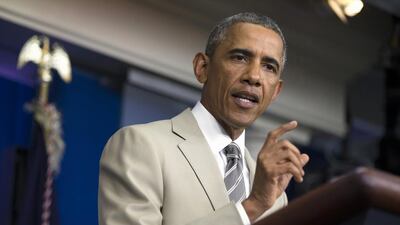President Barack Obama was roundly criticised recently when he admitted that the US lacked a strategy to confront ISIL. On Wednesday, Mr Obama sought to redress the balance, when he addressed the American people about how a US-led coalition would eliminate the group's threat via a concerted bombing campaign inside Syria, more troops and arming moderate rebel groups.
But the speech did not dispel the impression that the US still lacks a clear strategy with specific achievable goals. This is not entirely surprising, given that a central tenet of Mr Obama’s presidency has been disengagement with the war in Iraq started by his predecessor. The US has already spent 11 years in the country, at a cost of more than 4,000 American soldiers’ lives, more than a trillion dollars and a diminished global respect for US leadership.
That is not to say that having a strategy is necessarily a panacea either. Former president George W Bush had a clear plan when the US invaded Iraq in 2003 and it proved disastrous – leading directly to the security vacuum that ISIL has exploited, prompting the US re-engagement.
But still a longer-term plan is needed rather than simply reacting to events like ISIL’s recent military success. Mr Obama himself said three months ago that the US “can’t play whack-a-mole and send US troops to wherever these organisations pop up”. Even if ISIL is eliminated, disengaging once more is likely to mean the renewed security vacuum will be filled by another extremist group.
Mr Obama deserves some sympathy for the situation that he finds himself in. The wars of Iraq and Afghanistan were not of his making and the situation he inherited in the Middle East was chaotic, while the global financial crisis prompted him to concentrate his efforts on domestic affairs.
One suspects this intervention will be a blip and the only US strategy remains one of disengagement. If that is the case, the Arab League and the GCC countries need to fill that vacuum of leadership.
As the September 11 anniversary fades, the US ought to remember that disputes in far-off places do not always stay there. This is why a robust and realistic US strategy will help ensure security in this region and at home.

